War with the Newts
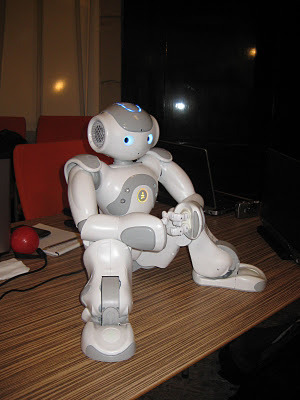 Karel Čapek's play R.U.R. (Rossum's Universal Robots) set the agenda for the robot in SF, not least by naming it. Its 2011 republication in the Gollancz SF Masterworks series (in one volume with Capek's 1936 novel War with the Newts, and informatively introduced by Adam Roberts) gives us a fresh opportunity to look at this taproot text. We all know the story: robots are created to serve humanity, and after some time they rise up and destroy their human masters. If we've read a little more about the play, we know that Čapek's robots aren't mechanical but quasi-organic: what in later SF would be called androids or replicants. Few of us have actually read it. More of us should.
Karel Čapek's play R.U.R. (Rossum's Universal Robots) set the agenda for the robot in SF, not least by naming it. Its 2011 republication in the Gollancz SF Masterworks series (in one volume with Capek's 1936 novel War with the Newts, and informatively introduced by Adam Roberts) gives us a fresh opportunity to look at this taproot text. We all know the story: robots are created to serve humanity, and after some time they rise up and destroy their human masters. If we've read a little more about the play, we know that Čapek's robots aren't mechanical but quasi-organic: what in later SF would be called androids or replicants. Few of us have actually read it. More of us should.I didn't know until I read the play a few weeks ago that it's funny. And I'd never reflected on the significance of its place and date of publication: Prague, 1920. When the risen robots issue a manifesto to all the robots of the world, propagated in leaflets by the shipload, the echo of the Russian revolution is loud and clear. Other aspects of the rebellion evoke a slave - or colonial - uprising. From their first clunky steps, robots in SF have carried a heavy freight of human anxieties.
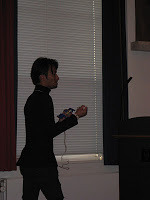 A month ago I spent three days in Amsterdam, as a guest of the International Conference on Social Robotics 2011, where I gave the closing keynote. The opening keynote was by a much more consequent speaker: the academic, inventor and entrepreneur Tomotaka Takahashi, who charmed and amazed us all with his cute and accomplished humanoid ROPID and his energetic toy robot Evolta (of Panasonic battery ad fame), and gave us an intriguing rationale for creating small humanoid robots: small for safety, humanoid because we can talk to them without feeling self-conscious, thus making them an ideal interface for all the other gadgets we have around the house. But the best reason, he said, was 'creating new fun', as Steve Jobs did with the iPhone.
A month ago I spent three days in Amsterdam, as a guest of the International Conference on Social Robotics 2011, where I gave the closing keynote. The opening keynote was by a much more consequent speaker: the academic, inventor and entrepreneur Tomotaka Takahashi, who charmed and amazed us all with his cute and accomplished humanoid ROPID and his energetic toy robot Evolta (of Panasonic battery ad fame), and gave us an intriguing rationale for creating small humanoid robots: small for safety, humanoid because we can talk to them without feeling self-conscious, thus making them an ideal interface for all the other gadgets we have around the house. But the best reason, he said, was 'creating new fun', as Steve Jobs did with the iPhone.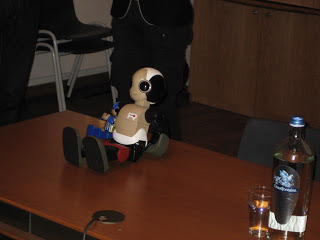
There was much fun to be had: social robotics is a new and thriving field, looking at the integration of robots into society through a cluster of lenses, from the technical through the sociological to the cultural. Papers presented ranged from empirical studies of human-robot interaction to such wonderfully speculative flights as the pressing question of whom (or what) to sue if a sexbot AI steals your partner's affections.
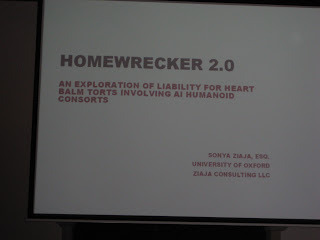
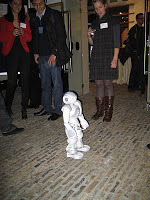 There was a lively exhibit of work-in-progress posters, some accompanied by demonstrations of actual robots. The programmable Nao robot has become a test platform for much research, and has even been used in robot theatre and stand-up. (I suggested to Heather Knight, the impressario of these events, that a production of R.U.R. with Nao robots would be screamingly funny, but she didn't think it feasible.) Some intrepid engineers are even working on general-purpose humanoid household robots, and pit their creations against each other in the competition RoboCup@Home (inspired by the robot football competition, RoboCup) with sometimes hilarious results.
There was a lively exhibit of work-in-progress posters, some accompanied by demonstrations of actual robots. The programmable Nao robot has become a test platform for much research, and has even been used in robot theatre and stand-up. (I suggested to Heather Knight, the impressario of these events, that a production of R.U.R. with Nao robots would be screamingly funny, but she didn't think it feasible.) Some intrepid engineers are even working on general-purpose humanoid household robots, and pit their creations against each other in the competition RoboCup@Home (inspired by the robot football competition, RoboCup) with sometimes hilarious results. My impressions, from the exhibits and from the entries in the competition which I took part in judging, are that some of the most immediately applicable work is being done with unwell children and the frail elderly. Children with autism, in particular, seem to benefit measurably from interaction with friendly, cuddly robots. These robots are sophisticated, but remotely controlled in real time by concealed operators - what's known as the 'Wizard of Oz' approach, which is also widely used as a quick-and-dirty method of gauging human-robot interaction.
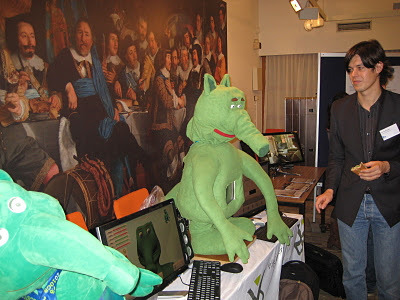
I find myself wondering whether we'd be working with humanoid robots at all, let alone mentally and verbally classifying them with mechanisms as diverse as autonomous vaccum-cleaners and industrial arms, if it weren't for SF, through Dick and Asimov and all the way back to Čapek. Just as well, perhaps, that intelligent marine creatures haven't crawled ashore - yet.

Published on December 23, 2011 10:48
No comments have been added yet.
Ken MacLeod's Blog
- Ken MacLeod's profile
- 762 followers
Ken MacLeod isn't a Goodreads Author
(yet),
but they
do have a blog,
so here are some recent posts imported from
their feed.



